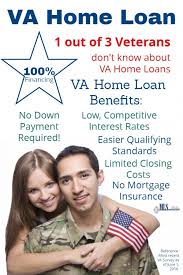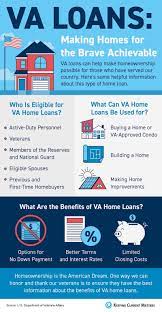The VA Home Loan Program: A Benefit for Veterans
For veterans and active duty military personnel, the VA Home Loan Program offers a valuable opportunity to achieve the dream of homeownership. Administered by the Department of Veterans Affairs (VA), this program provides eligible veterans with favorable terms and benefits that are not typically available through traditional mortgage loans.
One of the key advantages of the VA Home Loan Program is that it allows qualified veterans to purchase a home with no down payment. This can be a significant financial benefit for those who may not have substantial savings for a down payment. Additionally, VA loans do not require private mortgage insurance (PMI), which can result in lower monthly payments compared to conventional loans.
Another important feature of the VA Home Loan Program is its flexible eligibility requirements. Veterans, active duty service members, National Guard and Reserve members, and some surviving spouses may be eligible for a VA loan. The program also considers factors such as credit history, income, and employment stability when evaluating loan applications.
In addition to offering competitive interest rates, VA loans provide protections for borrowers in financial distress. The VA has programs in place to assist veterans who are struggling to make their mortgage payments, helping them avoid foreclosure and stay in their homes.
Overall, the VA Home Loan Program is a valuable benefit that honors the service and sacrifice of our nation’s veterans. By providing access to affordable homeownership opportunities, this program plays a crucial role in supporting veterans as they transition to civilian life.
Top 8 Frequently Asked Questions About the VA Home Loan Program
- Is it good to buy a house with a VA loan?
- What are the benefits of having a VA home loan?
- How much does the VA give for home loans?
- What credit score do you need for a VA loan?
- What credit score is required for a VA home loan?
- What is a VA loan and how does it work?
- Is it hard to get a home with a VA loan?
- What exactly is the VA home loan?
Is it good to buy a house with a VA loan?
When considering whether to buy a house with a VA loan, it’s important to weigh the benefits and considerations. The VA loan program offers attractive features such as no down payment requirement, competitive interest rates, and no need for private mortgage insurance. These benefits can make homeownership more accessible for eligible veterans and active duty military personnel. However, it’s essential to carefully evaluate your financial situation and long-term housing plans before deciding. While VA loans offer advantages, they also have specific eligibility requirements and limitations that may impact your home buying process. Consulting with a knowledgeable lender or financial advisor can help you determine if using a VA loan is the right choice for your individual circumstances.
What are the benefits of having a VA home loan?
The benefits of having a VA home loan are numerous and significant. One key advantage is the ability to purchase a home with no down payment, making homeownership more accessible for veterans. VA loans also do not require private mortgage insurance (PMI), resulting in potential cost savings for borrowers. Additionally, VA loans often offer lower interest rates compared to conventional loans, reducing the overall cost of borrowing. The program’s flexible eligibility requirements and protections for borrowers facing financial difficulties further enhance the appeal of VA home loans. Overall, the VA home loan program provides valuable benefits that recognize and support the service of our nation’s veterans.
How much does the VA give for home loans?
One frequently asked question about the VA Home Loan Program is, “How much does the VA give for home loans?” The Department of Veterans Affairs does not actually lend money for VA home loans. Instead, they guarantee a portion of the loan provided by private lenders, which allows veterans to secure favorable terms and conditions, such as no down payment and competitive interest rates. The amount that a veteran can borrow through a VA home loan is determined by the lender based on factors like income, credit history, and debt-to-income ratio. Veterans should work with approved VA lenders to explore their loan options and determine the maximum amount they can borrow based on their individual financial circumstances.
What credit score do you need for a VA loan?
One frequently asked question about the VA Home Loan Program is: “What credit score do you need for a VA loan?” While there is no specific minimum credit score required for a VA loan, most lenders typically look for a credit score of around 620 or higher. However, the VA loan program is known for being more flexible than conventional loans when it comes to credit requirements. Even if an applicant has a lower credit score, they may still be able to qualify for a VA loan by demonstrating other positive financial factors, such as stable income and manageable debt-to-income ratio. It’s important for prospective borrowers to discuss their specific situation with a lender to determine their eligibility and explore available options within the VA Home Loan Program.
What credit score is required for a VA home loan?
One of the most frequently asked questions about the VA Home Loan Program is regarding the credit score requirements. Unlike conventional loans that often have strict credit score criteria, VA loans are known for their flexibility in this regard. While there is no specific minimum credit score required by the VA, most lenders typically look for a credit score of around 620 or higher to qualify for a VA home loan. However, it’s important to note that individual lenders may have their own credit score requirements, so it’s advisable for potential borrowers to check with different lenders to find one that suits their financial situation best.
What is a VA loan and how does it work?
A VA loan is a mortgage loan program specifically designed to help veterans, active duty service members, and eligible surviving spouses purchase a home with favorable terms and benefits. The Department of Veterans Affairs guarantees a portion of the loan, which allows lenders to offer more favorable terms, such as no down payment requirement and competitive interest rates. To qualify for a VA loan, applicants must meet certain eligibility criteria, including serving a minimum period of active duty service or being a current member of the military. The VA loan program provides an excellent opportunity for veterans to achieve homeownership with financial benefits that are not typically available through conventional mortgage loans.
Is it hard to get a home with a VA loan?
Obtaining a home with a VA loan is not necessarily difficult, but it does require meeting certain eligibility criteria and following the application process. The VA Home Loan Program is designed to make homeownership more accessible for veterans and active duty military personnel by offering favorable terms and benefits. As long as you meet the program’s requirements, such as having a valid Certificate of Eligibility (COE) and meeting income and credit standards, getting a home with a VA loan can be a smooth process. Additionally, VA loans often have more flexible qualification standards compared to conventional loans, making them an attractive option for those who have served in the military.
What exactly is the VA home loan?
The VA home loan is a mortgage program designed to help eligible veterans, active duty service members, and certain surviving spouses purchase homes with favorable terms and benefits. Administered by the Department of Veterans Affairs (VA), this program allows qualified individuals to secure financing for a home purchase without requiring a down payment. VA loans also offer competitive interest rates, no private mortgage insurance (PMI) requirement, and flexible eligibility criteria. Overall, the VA home loan is a valuable opportunity for those who have served our country to achieve the dream of homeownership with financial advantages not typically available through traditional mortgage loans.



